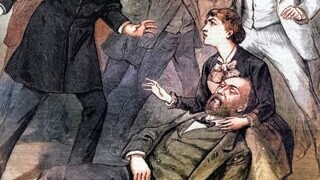The First Metal Detector Failed To Save Garfield From A Bullet

Today, metal detectors are most often used to spot hidden weapons, to stop people from shooting you. Originally, metal detectors were invented to deal with the aftermath of shootings—Gustave Trouvé invented the first one in 1874 to locate bullets in injured patients. It really seems fitting, when you think about it, that this high-tech device that uses a magnetic field and waves was originally medical equipment.
A few years later, President James Garfield was assassinated, just four months into his presidency. Surely, there was no better time than now for the metal detector to show off its stuff. Alexander Graham Bell put together a newly revamped version for the occasion. But when they brought forth the contraption, it failed to zero in on the bullet somewhere around his pancreas. It detected too much other nearby metal. Mainly the metal in the bed frame, and the metal bedsprings in the man's mattress.
This wasn't Bell's fault, or the fault of the Navy engineers running around. They knew the source of the interference (though metal bedsprings were rare at the time, with the White House mattress being one of the few mattresses to contain any). The problem was Garfield's doctor, who forbade anyone from moving the president to a different bed. He also forbade anyone from turning him onto his right side, exposing his left—had they brought the detector to his left side, it would have found the bullet, bed springs or no bed springs.
Don't Miss
This doctor was named Doctor Bliss. Doctor was his first name, as well as his title, so his full name was Dr. Doctor Willard Bliss. He'd previously been expelled from a medical society for wanting to admit Black members (an honorable stance) and for supporting homeopathy (uh, not such an honorable stance that time, Doctor).
Garfield actually survived the shooting, and he might have recovered. But he couldn't recover from Doctor Doctor and the other doctors prodding his wounds with their unwashed fingers. Infection set in, and he wasted away, despite the medical team trying to nourish him by pouring soup into his anus. He died 79 days after the shooting, on September 19, 1881. It was an appropriate day to die. Garfield hated Mondays.
We’ve partnered with the legendary Stand Up! Records to offer three winners each a bundle of four comedy specials on vinyl. Enter below for your chance to win, and learn more here.
For more on presidential assassinations, check out:
JFK May Have Survived His Assassination If Not For A Recent Sex Injury
The Lincoln Assassination Plan Was an Ode to Stupidity
Before He Settled On Reagan, Looks Like His Assassin Targeted Jimmy Carter
Follow Ryan Menezes on Twitter for more stuff no one should see.
Top image via Wiki Commons
